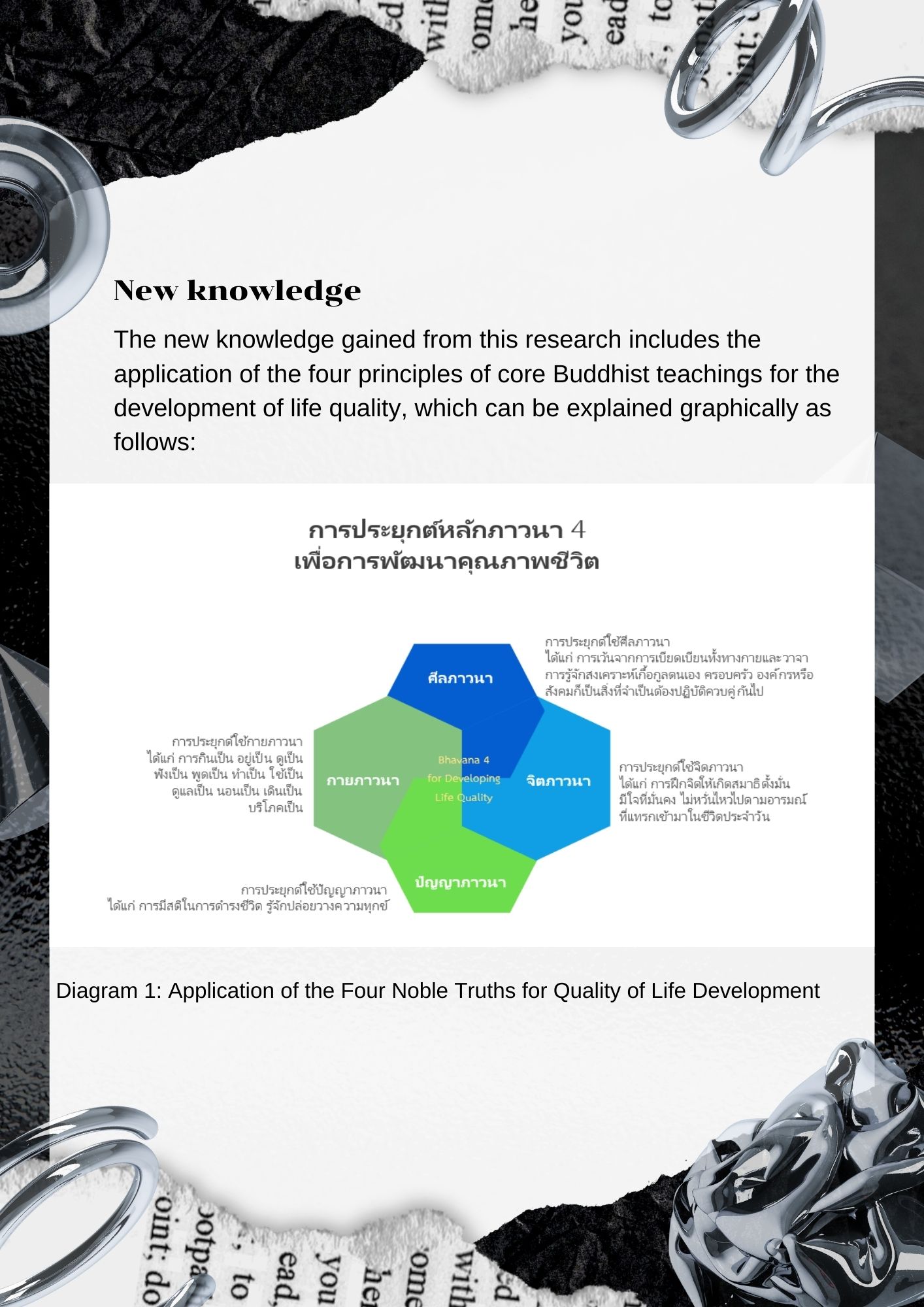Bhavana 4 for Developing Life Quality
Keywords:
Bhavana 4, Quality of Life, DevelopmentAbstract
This research is a qualitative study involving document analysis. Its objective is to analyze the four noble truths for life development. The research findings indicate that the Bhavana 4 serve as principles for developing life quality in four aspects : 1) the development of physical behavior, 2) the development of physical and verbal conduct, 3) the development of the mind or emotions, and 4) the development of intelligence. Applying the Bhavana 4 for life development can be done as follows : 1) Application of Corporeal Cultivation includes adopting appropriate behaviors in perceiving various stimuli affecting oneself through the senses of sight, hearing, smell, taste, and touch. It involves utilizing the body to interact creatively with the physical environment, resulting in benefits such as eating mindfully, staying present, listening attentively, speaking kindly, acting purposefully, utilizing resources wisely, caring for oneself, sleeping well, walking mindfully, and consuming responsibly. 2) Application of Moral Cultivation involves abstaining from harming oneself and others physically and verbally to maintain one's well-being, family, and society, preventing emotional turmoil caused by inappropriate or unwarranted conduct. 3) Application of Spiritual Cultivation includes training the mind to establish firm mindfulness, stability, and non-reactivity to emotions that intrude into daily life. 4) Wisdom Cultivation involves being mindful in living, making well-rounded, thoughtful decisions, and knowing how to release suffering from clinging to certainty.
References
จินุกูล หลวงอภัย. (2561). การพัฒนาทรัพยากรมนุษย์ตามหลักภาวนาธรรมของศูนย์ฝึกอบรมตำรวจภูธรภาค 6 จังหวัดนครสวรรค์. วารสารวิจยวิชาการ, 1(2), 75-92.
ณิชาพัฒน์ คําดี. (2565). หลักภาวนา 4 กับการส่งเสริมการปฏิบัติงานของบุคลากรยุคชีวิตวิถีใหม่. วารสารสหวิทยาการนวัตกรรมปริทรรศน, 5(2), 79-90.
พระพรหมคุณาภรณ์ (ป.อ. ปยุตฺโต). (2546). พจนานุกรมพุทธศาสตร์ ฉบับประมวลธรรม. กรุงเทพฯ: การศาสนา.
พระพรหมคุณาภรณ์ (ป.อ. ปยุตฺโต). (2552). พจนานุกรมพุทธศาสตร์ ฉบับประมวลธรรม. (พิมพ์ครั้งที่ 17). กรุงเทพฯ : สำนักพิมพ์จันทร์เพ็ญ.
พระภูชิสสะ ปญฺญาปโชโต. (2562). การสร้างกระบวนการเสริมสร้างสุขภาวะตามหลักภาวนา 4 ในตำบลยางฮอม อำเภอขุนตาล จังหวัดเชียงราย. วารสาร มจร การพัฒนาสังคม, 4(1), 49-63.
พระสุนทรกิตติคุณ. (2560). หลักพุทธธรรมกับการดูแลสุขภาพแบบองค์รวมในบุคลากร. วารสารมหาจุฬาวิชาการ, 3(1), 11-25.
พระสุเว่ย คุณรตโน (น้อย) และคณะ. (2565). การประยุกต์ใช้หลักภาวนา 4 เพื่อการพัฒนาคุณภาพชีวิตของชุมชนตำบลปกาสัย อำเภอเหนือคลอง จังหวัดกระบี่. วารสาร มจร อุบลปริทรรศน์, 7(1), 235-242.
ภาษิต สุขวรรณดี. (2559). การพัฒนามนุษย์ตามแนวภาวนา 4. สิรินธรปริทรรศน์, 17(1), 18-33.
วรสิทธิสิน หงส์ทอง, สุกัญญาณัฐ อบสิณ และพระครูนิวิฐศีลขันธ์. (2566). การประยุกต์ใช้หลักภาวนา 4 ในการพัฒนาศักยภาพของผู้สูงอายุภายในเขตเทศบาลเมืองพิชัย ตําบลพิชัย อําเภอเมือง จังหวัดลําปาง. วารสารวิจยวิชาการ, 6(2), 155-168.

Downloads
Published
How to Cite
Issue
Section
License
Copyright (c) 2024 Institute of Sufficiency Journal

This work is licensed under a Creative Commons Attribution-NonCommercial-NoDerivatives 4.0 International License.



